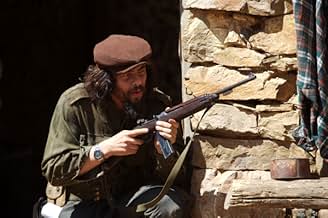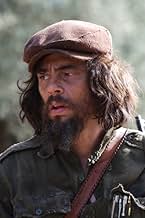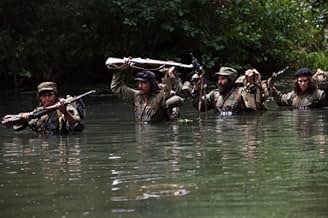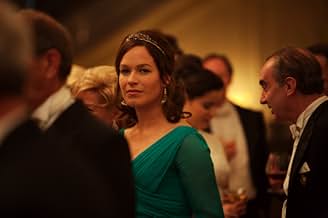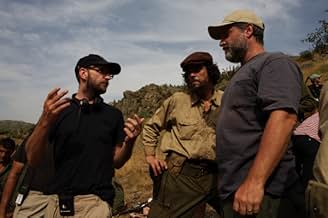NOTE IMDb
6,8/10
36 k
MA NOTE
En 1967, Ernesto « Che » Guevara dirige une petite armée partisane pour mener une guérilla révolutionnaire au destin malheureux en Bolivie, en Amérique du Sud.En 1967, Ernesto « Che » Guevara dirige une petite armée partisane pour mener une guérilla révolutionnaire au destin malheureux en Bolivie, en Amérique du Sud.En 1967, Ernesto « Che » Guevara dirige une petite armée partisane pour mener une guérilla révolutionnaire au destin malheureux en Bolivie, en Amérique du Sud.
- Réalisation
- Scénario
- Casting principal
- Récompenses
- 2 victoires et 7 nominations au total
Demián Bichir
- Fidel Castro
- (as Demian Bichir)
Avis à la une
I came to watch Guerrilla, part two of Steven Soderbergh's biopic of Che Guevara, without having seen the preceding film and without more than a cursory knowledge of Che's life. At the same time I was rather apprehensive that this would be both a heavy-going history lesson and an unrepentant love-letter to the iconic revolutionary. As it turns out, this film far exceeded my expectations.
Guerrilla works remarkably well as a standalone film. The story of Che's failed attempt to lead a revolution in Bolivia, then under military rule, is a compelling tragedy. The initial impetus brought by Che's arrival incognito to lead the guerrilla war is lost as misfortune follows misfortune. The odds stack up against the revolutionaries. US backing for the Bolivian army, hostile conditions in the rainforest, suspicious locals and Che's failing health are just some of the difficulties which beset the nascent rebellion.
Soderbergh's portrayal of Che is largely uncritical, but this film is no hagiography. The style is refreshingly undramatic, with a subtle and effective soundtrack by Alberto Iglesias adding quiet drama to many scenes. Che is undoubtedly the centre of the film but there are very few close-ups of his face and we are encouraged to see the people fighting alongside him and sometimes against him too. Where Soderbergh wishes to demonstrate Che's virtues we see it in small episodes such as the loyal acolyte who upbraids two fellow guerrillas when they question Che's leadership, and emphasises the sacrifice that he has made in leaving behind Cuba to fight again for revolution.
The direction throughout is superb. Part two feels tightly edited despite its narrow focus and is able to communicate a great deal through images without the need for a narrator to spell things out for the audience. At the start of the film we see a few short clips of lavish parties in post-revolutionary Cuba, immediately furnishing us with ideas as to why Che would sacrifice his old life to fight again in another country. Later on, the portrayal of guerrillas marching through the unending rainforests stands out as a strikingly beautiful scene and helps to create a feeling of the enormity of the task before this tiny band of revolutionaries.
If there is a problem with the film it is the distance between the viewer and Che, which, though it does allow us to appreciate the context of the insurgency and the people around him, makes it hard for us to understand him better as a person. True, Benicio Del Toro is utterly convincing in the lead role so much so that it is difficult to remember that you are watching an actor and not the man himself. However, watching Guerrilla as a standalone film means that we are given precious little insight into what is shaping Che's thoughts, words and actions. It is to be hoped that this is more to the fore in the first part of Soderbergh's biopic (I cannot comment on that yet), and certainly the strength of part two is making me look forward eagerly to seeing the prequel.
Guerrilla works remarkably well as a standalone film. The story of Che's failed attempt to lead a revolution in Bolivia, then under military rule, is a compelling tragedy. The initial impetus brought by Che's arrival incognito to lead the guerrilla war is lost as misfortune follows misfortune. The odds stack up against the revolutionaries. US backing for the Bolivian army, hostile conditions in the rainforest, suspicious locals and Che's failing health are just some of the difficulties which beset the nascent rebellion.
Soderbergh's portrayal of Che is largely uncritical, but this film is no hagiography. The style is refreshingly undramatic, with a subtle and effective soundtrack by Alberto Iglesias adding quiet drama to many scenes. Che is undoubtedly the centre of the film but there are very few close-ups of his face and we are encouraged to see the people fighting alongside him and sometimes against him too. Where Soderbergh wishes to demonstrate Che's virtues we see it in small episodes such as the loyal acolyte who upbraids two fellow guerrillas when they question Che's leadership, and emphasises the sacrifice that he has made in leaving behind Cuba to fight again for revolution.
The direction throughout is superb. Part two feels tightly edited despite its narrow focus and is able to communicate a great deal through images without the need for a narrator to spell things out for the audience. At the start of the film we see a few short clips of lavish parties in post-revolutionary Cuba, immediately furnishing us with ideas as to why Che would sacrifice his old life to fight again in another country. Later on, the portrayal of guerrillas marching through the unending rainforests stands out as a strikingly beautiful scene and helps to create a feeling of the enormity of the task before this tiny band of revolutionaries.
If there is a problem with the film it is the distance between the viewer and Che, which, though it does allow us to appreciate the context of the insurgency and the people around him, makes it hard for us to understand him better as a person. True, Benicio Del Toro is utterly convincing in the lead role so much so that it is difficult to remember that you are watching an actor and not the man himself. However, watching Guerrilla as a standalone film means that we are given precious little insight into what is shaping Che's thoughts, words and actions. It is to be hoped that this is more to the fore in the first part of Soderbergh's biopic (I cannot comment on that yet), and certainly the strength of part two is making me look forward eagerly to seeing the prequel.
Following directly from where the story left off in part one, the second half which sets about telling the inevitable downfall and much more grim side of the man's legacy is exactly as such. In direct contrast to the first feature, part two represents a shift from Che the pride and glory of a revolutionised country, to Chestruggling liberator of a country to which he has no previous ties. The change of setting isn't just aesthetic; from the autumn and spring greys of the woodlands comes a change of tone and heart to the feature, replacing the optimism of the predecessor with a cynical, battered and bruised reality aligned to an all new struggle. Yet, as Che would go on to say himselfsuch a struggle is best told exactly as thata struggle. While Part One certainly helped document that initial surge to power that the revolutionary guerrilla acquired through just that, Part Two takes a much more refined, callous and bleak segment of Che's life and ambition, and gives it an assertive portrayal that is both poignant and tragic in a tangible, easy to grasp manner.
While the movie's tone in some regards does stray off and differ quite drastically from Part One however, there still remains that same documented approach taken a month ago that avoids melodrama and fabrication as much as possible. This somewhat distant, cold approach to telling Che's story and struggle will no doubt turn some viewers off; indeed, I still remain reserved about whether or not the feature itself should have been named after one manif anything, the entirety of Che, taken as a whole, delivers a tale that goes beyond mere biography and instead documents a man's struggle alongside those who helped carry him along the way. By no means does Soderbergh try to paint a humanistic portrait here akin to what Hirschbiegel did with Der Untergang half a decade ago (excuse the ironic contrast); Che is a slow moving, reserved and meditative approach to telling a history lesson that just happens to be narrated by the one man who arguably- conducted the whole thing.
Yet by moving from the lush green landscapes of Cuba and retreating to the bleak, decaying backdrop of Bolivia for Part Two, the story does inevitably take on a distinctly contrasting tone that doesn't feel too disjointed from its predecessor, but does enough to give it its own reference points. Here, the basic structure of Part One is echoed backthere's the initial struggle, the battles, the fallen comrades and the recruiting of those to replace them, all the while we see some glimpses of the man behind the movement. Yet, as anyone with the vaguest idea of the actual history behind the feature will know, Part Two is destined to end on a much more underwhelming, and disquieting note. This difference, in combination with the similarities to Part One, make a compelling and memorable whole; by all means, both could be digested one their own (and kudos to Soderbergh for achieving as such) and enjoyed as they are, but taken as one statement, Che delivers exactly what it sets out to achieve.
Indeed, everything that made Part One the treat that it was one month prior is still evident here from the subtle yet engrossing performances from the central cast to the slow building, realistically structured combat scenesthe drama inherent to the characters on screen is just as vague and indiscernible, but with a feature such as this, Part Two once again proves that avoiding such elements don't necessarily hurt a film when there is enough plot and reflection on other elements to keep the viewer engaged. In fact, upon writing this review I was at odds as to whether or not to simply add a paragraph or two to my initial review for Part One, and title the review as a whole, yet I felt that to do so would only serve to disillusion those who may sit down to watch the entirety of both films consecutively.
With that said, I cannot rightfully decree whether or not Che holds up to the task of engaging an audience for its sprawling four hour plus runtime, but upon viewing both segments I can at least attest to each part's ability to do just that. With a reflective, intricate screenplay combined with endlessly mesmerising photography and nuanced performances that do justice to the movie's characters without drawing attention to themselves, Che Part Two is every bit as compelling and rewarding as its predecessor, but this time with a tragic but uplifting, reaffirming conclusion fit for the history pages of film.
While the movie's tone in some regards does stray off and differ quite drastically from Part One however, there still remains that same documented approach taken a month ago that avoids melodrama and fabrication as much as possible. This somewhat distant, cold approach to telling Che's story and struggle will no doubt turn some viewers off; indeed, I still remain reserved about whether or not the feature itself should have been named after one manif anything, the entirety of Che, taken as a whole, delivers a tale that goes beyond mere biography and instead documents a man's struggle alongside those who helped carry him along the way. By no means does Soderbergh try to paint a humanistic portrait here akin to what Hirschbiegel did with Der Untergang half a decade ago (excuse the ironic contrast); Che is a slow moving, reserved and meditative approach to telling a history lesson that just happens to be narrated by the one man who arguably- conducted the whole thing.
Yet by moving from the lush green landscapes of Cuba and retreating to the bleak, decaying backdrop of Bolivia for Part Two, the story does inevitably take on a distinctly contrasting tone that doesn't feel too disjointed from its predecessor, but does enough to give it its own reference points. Here, the basic structure of Part One is echoed backthere's the initial struggle, the battles, the fallen comrades and the recruiting of those to replace them, all the while we see some glimpses of the man behind the movement. Yet, as anyone with the vaguest idea of the actual history behind the feature will know, Part Two is destined to end on a much more underwhelming, and disquieting note. This difference, in combination with the similarities to Part One, make a compelling and memorable whole; by all means, both could be digested one their own (and kudos to Soderbergh for achieving as such) and enjoyed as they are, but taken as one statement, Che delivers exactly what it sets out to achieve.
Indeed, everything that made Part One the treat that it was one month prior is still evident here from the subtle yet engrossing performances from the central cast to the slow building, realistically structured combat scenesthe drama inherent to the characters on screen is just as vague and indiscernible, but with a feature such as this, Part Two once again proves that avoiding such elements don't necessarily hurt a film when there is enough plot and reflection on other elements to keep the viewer engaged. In fact, upon writing this review I was at odds as to whether or not to simply add a paragraph or two to my initial review for Part One, and title the review as a whole, yet I felt that to do so would only serve to disillusion those who may sit down to watch the entirety of both films consecutively.
With that said, I cannot rightfully decree whether or not Che holds up to the task of engaging an audience for its sprawling four hour plus runtime, but upon viewing both segments I can at least attest to each part's ability to do just that. With a reflective, intricate screenplay combined with endlessly mesmerising photography and nuanced performances that do justice to the movie's characters without drawing attention to themselves, Che Part Two is every bit as compelling and rewarding as its predecessor, but this time with a tragic but uplifting, reaffirming conclusion fit for the history pages of film.
- A review by Jamie Robert Ward (http://www.invocus.net)
Part One left Che on the road to Havana following the overthrow of the Batista dictatorship; Part Two jumps forward seven years, so that we miss out his time as a Minister in Castro's government and his abortive adventures in the Congo. Compared to the earlier film, this second element of the diptych is much tighter than the first in narrative terms, focusing only on Che's year in Bolivia (1966-67) and takes a straightforward chronological approach.
It has some of the strengths of the first film: the cinematography and direction of Steven Soderbergh, which give the whole work a lifelike, almost documentary feel, and the superb acting of Benicio del Toro who - even more than before - is rarely off the screen. However, the narrative is less compelling this time with the guerrillas seemingly going from one place to another with no obvious strategy. The main criticism of both parts though is that we have over four hours of excessively reverential treatment of an immensely controversial figure with little acknowledgement of the egotism that was at the heart of the doomed Bolivian mission.
It has some of the strengths of the first film: the cinematography and direction of Steven Soderbergh, which give the whole work a lifelike, almost documentary feel, and the superb acting of Benicio del Toro who - even more than before - is rarely off the screen. However, the narrative is less compelling this time with the guerrillas seemingly going from one place to another with no obvious strategy. The main criticism of both parts though is that we have over four hours of excessively reverential treatment of an immensely controversial figure with little acknowledgement of the egotism that was at the heart of the doomed Bolivian mission.
Ironically the most talked-about American film in the 2008 New York Film Festival is 98% in Spanish. The extra-long film's controversy began at the Cannes Festival. There were love-hate notices, and considerable doubts about commercial prospects. As consolation the star, Benicio Del Toro, got the Best Actor award there. I'm talking about Steven Soderbergh's 'Che,' of course. That's the name it's going by in this version, shown in New York as at Cannes in two 2-hour-plus segments without opening title or end credits. 'Che' is certainly appropriate since Ernesto "Che" Guevara is in almost every scene. Del Toro is impressive, hanging in reliably through thick and thin, from days of glorious victory in part one to months of humiliating defeat in part two, appealing and simpatico in all his varied manifestations, even disguised as a bald graying man to sneak into Bolivia. It's a terrific performance; one wishes it had a better setting.
If you are patient enough to sit through the over four hours, with an intermission between the two sections, there are rewards. There's an authentic feel throughout--fortunately Soderbergh made the decision to film in Spanish (though some of the actors, oddly enough in the English segments especially, are wooden). You get a good outline of what guerrilla warfare, Che style, was like: the teaching, the recruitment of campesinos, the morality, the discipline, the hardship, and the fighting--as well as Che's gradual morphing from company doctor to full-fledged military leader. Use of a new 9-pound 35 mm-quality RED "digital high performance cine camera" that just became available in time for filming enabled DP Peter Andrews and his crew to produce images that are a bit cold, but at times still sing, and are always sharp and smooth.
The film is in two parts--Soderbergh is calling them two "films," and the plan is to release them commercially as such. First is 'The Argentine,' depicting Che's leadership in jungle and town fighting that led up to the fall of Havana in the late 50's, and the second is 'Guerrilla,' and concerns Che's failed effort nearly a decade later in Bolivia to spearhead a revolution, a fruitful mission that led to Guevara's capture and execution in 1967. The second part was to have been the original film and was written first and, I think, shot first. Producer Laura Bickford says that part two is more of a thriller, while part one is more of an action film with big battle scenes. Yes, but both parts have a lot in common--too much--since both spend a large part of their time following the guerrillas through rough country. Guerrilla an unmitigated downer since the Bolivian revolt was doomed from the start. The group of Cubans who tried to lead it didn't get a friendly reception from the Bolivian campesinos, who suspected foreigners, and thought of the Cuban communists as godless rapists. There is a third part, a kind of celebratory black and white interval made up of Che's speech at the United Nations in 1964 and interviews with him at that time, but that is inter-cut in the first segment. The first part also has Fidel and is considerably more upbeat, leading as it does to the victory in Santa Clara in 1959 that led to the fall of the dictatorship of Fulgencio Batista in Cuba.
During 'Guerilla' I kept thinking how this could indeed work as a quality European-style miniseries, which might begin with a shortened version of Walter Salles's 'Motorcycle Diaries' and go on to take us to Guevara's fateful meeting with Fidel in Mexico and enlistment in the 26th of July Movement. There could be much more about his extensive travels and diplomatic missions. This is far from a complete picture of the man, his childhood interest in chess, his lifelong interest in poetry, the books he wrote; even his international fame is only touched on. And what about his harsh, cruel side? Really what Soderbergh is most interested in isn't Che, but revolution, and guerrilla warfare. The lasting impression that the 4+ hours leave is of slogging through woods and jungle with wounded and sick men and women and idealistic dedication to a the cause of ending the tyranny of the rich. Someone mentioned being reminded of Terrence Malick's 'The Tin Red Line,' and yes, the meandering, episodic battle approach is similar; but 'The Thin Red Line' has stronger characters (hardly anybody emerges forcefully besides Che), and it's a really good film. This is an impressive, but unfinished and ill-fated, effort.
This 8-years-gestating, heavily researched labor of love (how many more Ocean's must come to pay for it?) is a vanity project, too long for a regular theatrical release and too short for a miniseries. Radical editing--or major expansion--would have made it into something more successful, and as it is it's a long slog, especially in the second half.
It's clear that this slogging could have been trimmed down, though it's not so clear what form the resulting film would have taken--but with a little bit of luck it might have been quite a good one.
If you are patient enough to sit through the over four hours, with an intermission between the two sections, there are rewards. There's an authentic feel throughout--fortunately Soderbergh made the decision to film in Spanish (though some of the actors, oddly enough in the English segments especially, are wooden). You get a good outline of what guerrilla warfare, Che style, was like: the teaching, the recruitment of campesinos, the morality, the discipline, the hardship, and the fighting--as well as Che's gradual morphing from company doctor to full-fledged military leader. Use of a new 9-pound 35 mm-quality RED "digital high performance cine camera" that just became available in time for filming enabled DP Peter Andrews and his crew to produce images that are a bit cold, but at times still sing, and are always sharp and smooth.
The film is in two parts--Soderbergh is calling them two "films," and the plan is to release them commercially as such. First is 'The Argentine,' depicting Che's leadership in jungle and town fighting that led up to the fall of Havana in the late 50's, and the second is 'Guerrilla,' and concerns Che's failed effort nearly a decade later in Bolivia to spearhead a revolution, a fruitful mission that led to Guevara's capture and execution in 1967. The second part was to have been the original film and was written first and, I think, shot first. Producer Laura Bickford says that part two is more of a thriller, while part one is more of an action film with big battle scenes. Yes, but both parts have a lot in common--too much--since both spend a large part of their time following the guerrillas through rough country. Guerrilla an unmitigated downer since the Bolivian revolt was doomed from the start. The group of Cubans who tried to lead it didn't get a friendly reception from the Bolivian campesinos, who suspected foreigners, and thought of the Cuban communists as godless rapists. There is a third part, a kind of celebratory black and white interval made up of Che's speech at the United Nations in 1964 and interviews with him at that time, but that is inter-cut in the first segment. The first part also has Fidel and is considerably more upbeat, leading as it does to the victory in Santa Clara in 1959 that led to the fall of the dictatorship of Fulgencio Batista in Cuba.
During 'Guerilla' I kept thinking how this could indeed work as a quality European-style miniseries, which might begin with a shortened version of Walter Salles's 'Motorcycle Diaries' and go on to take us to Guevara's fateful meeting with Fidel in Mexico and enlistment in the 26th of July Movement. There could be much more about his extensive travels and diplomatic missions. This is far from a complete picture of the man, his childhood interest in chess, his lifelong interest in poetry, the books he wrote; even his international fame is only touched on. And what about his harsh, cruel side? Really what Soderbergh is most interested in isn't Che, but revolution, and guerrilla warfare. The lasting impression that the 4+ hours leave is of slogging through woods and jungle with wounded and sick men and women and idealistic dedication to a the cause of ending the tyranny of the rich. Someone mentioned being reminded of Terrence Malick's 'The Tin Red Line,' and yes, the meandering, episodic battle approach is similar; but 'The Thin Red Line' has stronger characters (hardly anybody emerges forcefully besides Che), and it's a really good film. This is an impressive, but unfinished and ill-fated, effort.
This 8-years-gestating, heavily researched labor of love (how many more Ocean's must come to pay for it?) is a vanity project, too long for a regular theatrical release and too short for a miniseries. Radical editing--or major expansion--would have made it into something more successful, and as it is it's a long slog, especially in the second half.
It's clear that this slogging could have been trimmed down, though it's not so clear what form the resulting film would have taken--but with a little bit of luck it might have been quite a good one.
Possibly the most brilliant thing about Che: Part Two, as we begin to integrate it with Part One in our minds, is that there is no clarification of why Che chose to confidentially abscond from Cuba after the revolution, no allusion to his experience in the Congo, no clarification of why he chose Bolivia as his subsequent setting for a coup d'etat, no allusion to the political decisions he made as a young man motorcycling across South America, which Walter Salles has given prominent familiarity. Extraordinary focus is given to Che meeting the volunteers who accompany his guerrilla factions. Yet hardly any endeavor is made to single them out as individuals, to establish involved relationships. He is reasonably unreasonable. Che drives an unbreakable doctrine to leave no wounded man behind. But there is no feeling that he is deeply directly concerned with his men. It is the concept.
In Part 1, in Cuba, the rebels are welcomed by the people of the villages, given food and cover, supported in what grows to be a victorious revolution. Here, in Bolivia, not much understanding is apparent. Villagers expose him. They protect government troops, not his own. When he expounds on the onesidedness of the government medical system, his audience appears uninterested. You cannot lead a people into revolution if they do not want to comply. Soderbergh shows U.S. military advisers working with the Bolivians, but doesn't fault the United States for Che's collapse. Che seems to have just misfigured his fight and the place where he wanted to have it.
In showcasing both wars, Soderbergh doesn't build his battle scenes as actions with specific results. Che's men attack and are attacked. They exchange fire with faraway assailants. There is generally a cut to the group in the aftershock of combat, its death toll not paused for. This is not a war movie. It is about one man's reasonably unreasonable drive to endure. There is no elaborate cinematography. Soderbergh looks firmly at Che's inflexible dedication. There are remarkable sporadic visceral shots, but being few they are all the more powerful, such as Che's POV shot during his final beats. There is an abundance of the terrain, where these men live for weeks at a time, and the all-consuming effect is of languor, Guevara himself having malaria part of the time.
Benicio Del Toro, one of the film's producers, gives a champion's performance, not least because it's modest. He isn't portrayed as the cutting edge like most epic heroes. In Cuba, he arises in conquest, in Bolivia, he falls to the reverse, and occasionally is actually difficult to distinguish behind a tangle of beard and hair. Del Toro illustrates not so much an identity as an attitude. You may think the film is too long. I think there's a genuine cause for its breadth. Guevara's affairs in Cuba and particularly Bolivia was not a sequence of episodes and sketches, but an undertaking of staying power that might virtually be called insane. In the end, Che as a whole or in parts is a commercially ballsy movie, one where its director begins by understanding the limits innate in cinematic biography and working progressively within those means.
In Part 1, in Cuba, the rebels are welcomed by the people of the villages, given food and cover, supported in what grows to be a victorious revolution. Here, in Bolivia, not much understanding is apparent. Villagers expose him. They protect government troops, not his own. When he expounds on the onesidedness of the government medical system, his audience appears uninterested. You cannot lead a people into revolution if they do not want to comply. Soderbergh shows U.S. military advisers working with the Bolivians, but doesn't fault the United States for Che's collapse. Che seems to have just misfigured his fight and the place where he wanted to have it.
In showcasing both wars, Soderbergh doesn't build his battle scenes as actions with specific results. Che's men attack and are attacked. They exchange fire with faraway assailants. There is generally a cut to the group in the aftershock of combat, its death toll not paused for. This is not a war movie. It is about one man's reasonably unreasonable drive to endure. There is no elaborate cinematography. Soderbergh looks firmly at Che's inflexible dedication. There are remarkable sporadic visceral shots, but being few they are all the more powerful, such as Che's POV shot during his final beats. There is an abundance of the terrain, where these men live for weeks at a time, and the all-consuming effect is of languor, Guevara himself having malaria part of the time.
Benicio Del Toro, one of the film's producers, gives a champion's performance, not least because it's modest. He isn't portrayed as the cutting edge like most epic heroes. In Cuba, he arises in conquest, in Bolivia, he falls to the reverse, and occasionally is actually difficult to distinguish behind a tangle of beard and hair. Del Toro illustrates not so much an identity as an attitude. You may think the film is too long. I think there's a genuine cause for its breadth. Guevara's affairs in Cuba and particularly Bolivia was not a sequence of episodes and sketches, but an undertaking of staying power that might virtually be called insane. In the end, Che as a whole or in parts is a commercially ballsy movie, one where its director begins by understanding the limits innate in cinematic biography and working progressively within those means.
Le saviez-vous
- AnecdotesWas the first feature-length movie to be shot with the Red One Digital Camera, as well as the first mainstream film to be shot in the 4K resolution. (Part One was also shot with this camera, but Part Two was shot first so Benicio Del Toro could gradually regain the weight he lost for this film)
- GaffesAt his execution, Che was shot a total of nine times, not three as shown in the movie.
- Citations
Ernesto Che Guevara: To survive here, to win... you have to live as if you've already died.
- Bandes originalesBalderrama
Lyrics by Manuel José Castilla
Music by Gustavo Leguizamon
Performed by Mercedes Sosa
Courtesy of Universal Music
Copyright (c) by Lagos Editorial (Warner/Chappell Music Argentina)
Meilleurs choix
Connectez-vous pour évaluer et suivre la liste de favoris afin de recevoir des recommandations personnalisées
Détails
- Date de sortie
- Pays d’origine
- Langues
- Aussi connu sous le nom de
- Che: Part Two
- Lieux de tournage
- Sociétés de production
- Voir plus de crédits d'entreprise sur IMDbPro
Box-office
- Budget
- 40 000 000 $US (estimé)
- Montant brut aux États-Unis et au Canada
- 748 555 $US
- Week-end de sortie aux États-Unis et au Canada
- 61 070 $US
- 14 déc. 2008
- Montant brut mondial
- 8 638 163 $US
- Durée2 heures 15 minutes
- Couleur
- Mixage
- Rapport de forme
- 1.85 : 1
Contribuer à cette page
Suggérer une modification ou ajouter du contenu manquant


